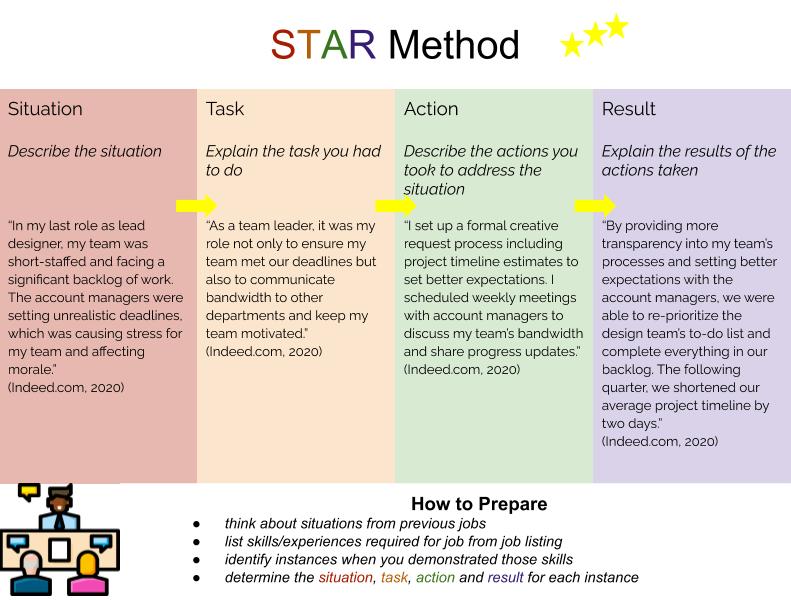74 Preparing to be Interviewed
Venecia Williams; Nia Sonja; and Verna Johnson
Although this chapter has focused on interviewing from the employer’s perspective, it’s equally important for managers to prepare to be interviewed themselves. Strong interview skills are essential if you’re seeking a new leadership role, switching industries, or moving up within your current organization.
The tips below outline how to prepare, present yourself, and respond effectively when you’re the one being interviewed.
Dress the Part
Your appearance sets the tone for the interview. Dressing professionally shows respect for the opportunity and helps you feel more confident.
-
Choose professional clothing, even if the workplace is casual.
-
Try on your complete outfit ahead of time to ensure it fits well and doesn’t distract you during the interview.
-
Unless instructed otherwise, err on being slightly overdressed rather than too casual.
Don’t Come Empty-Handed
Bringing key documents shows that you’re prepared and organized. This can include:
-
A clean, printed copy of your résumé
-
A copy of the job posting
-
A list of references
-
Work samples or portfolios (if applicable)
-
A notebook with brief notes and questions
Tip: Your notes should be neat, concise, and easy to scan—use keywords and short phrases rather than complete scripts.
Be Aware of Your Body Language
Non-verbal communication can say as much as your answers. Pay attention to the following:
-
Posture: Sit upright and avoid slouching or crossing your arms.
-
Eye contact: Maintain consistent (but natural) eye contact to show engagement.
-
Gestures: Use natural hand movements if that’s your style, but avoid fidgeting or repetitive motions.
-
Handshake: If customary, offer a confident, friendly handshake at the beginning of the interview.
Speak Clearly and Confidently
Make sure your responses are easy to follow:
-
Adjust your volume for the environment.
-
Avoid speaking too quickly or too softly.
-
Take a moment to gather your thoughts before answering, especially when answering challenging questions.
-
If you don’t understand a question, asking for clarification is fine.
Be Yourself—Professionally
While it’s important to present your best self, authenticity matters. The goal is to demonstrate that you would be a capable, collaborative team member and a good fit for the organization.
Tip: Show enthusiasm for the role and a willingness to learn, while remaining professional and focused.
Common Interview Questions
Interviewers for manager positions may encounter questions exploring technical skills and leadership ability. Examples include:
-
“Tell me about yourself.”
-
“Have you ever managed a team before?”
-
“Why do you want to work for our company?”
-
“What is your leadership style?”
-
“Tell me about a time when you faced a challenge as a manager. How did you handle it?”
-
“What do you consider your biggest professional achievement?”
-
“Where do you see yourself in five years?”
-
“What are your strengths? Weaknesses?”
-
“Why did you leave your last position?”
-
“Do you have any questions for us?”
When responding, consider both the literal question and its underlying purpose. For example, “Tell me about yourself” really asks, “What makes you a strong candidate for this job?”

Behavioural Questions and the STAR Method
You’re also likely to be asked behavioural questions that assess how you’ve handled situations in the past:
-
“Tell me about a time you resolved a conflict in your team.”
-
“Give an example of a time when you had to meet a tight deadline.”
-
“Describe a time you had to make a difficult decision.”
Use the STAR method to answer clearly:
-
Situation: What was happening?
-
Task: What were you responsible for?
-
Action: What did you do?
-
Result: What was the outcome?

Asking Your Own Questions
Interviewers will typically invite you to ask questions at the end. This is your chance to learn more about the role and work environment, demonstrate your preparation, and clarify whether the company is the right fit for you.
Sample questions include the following:
-
“What does a typical day in this role look like?”
-
“How is success measured for this position?”
-
“What are the company’s priorities this year, and how does this role contribute?”
-
“What opportunities are there for professional development?”
-
“How would you describe the team culture?”
-
“What are the next steps in the hiring process?”
Note: Unless prompted by the interviewer, avoid asking about salary or benefits at this stage.
Interviewing Is a Two-Way Process
As much as you are being assessed, you are also assessing the organization. Listen carefully to what the interviewer says—and doesn’t say. Consider:
-
Do their expectations align with your values and work style?
-
Are they clear about goals, support, and feedback?
-
Does their communication style seem like a good fit?
Being interviewed is an opportunity to present your qualifications and ensure you’re choosing the right role and employer for your career growth.
Figure 20.4 summarizes the interview process.

Attribution
This section contains material from Chapter 20.3 “Performance” in Fundamentals of Business Communication Revised (2022) and is used under a Creative Commons Attribution-ShareAlike 4.0 International License.
References
References are at the end of this chapter.
Media Attributions
- 10

